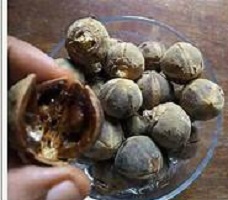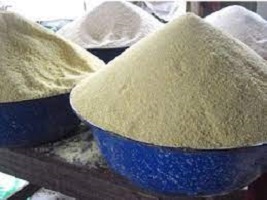Dried Goron Tula: How to Use Goron Tula Fruit When Dry
Dried Goron Tula: Many people are unsure how to use Goron Tula fruit, especially when it is dry.
Yes, indeed! The fruit can be extremely dry at times, to the point where purchasers mark them as “poor.”

During harmattan, you’re more likely to come across this kind of very dry Goron Tula with mold.
There are a few explanations for this.
One of them is Goron Tula’s resemblance to the kola nut, which causes it to behave similarly to kola.
The name comes from the Tula tribe in the north and means “kola.”
The fruit, on the other hand, becomes strong and hard during harmattan to protect itself from injury.
Some also start to grow mold.
This does not, however, imply that the fruit has lost its vitality or that it is unhealthy.
People Also Read: Overall Health Benefits of Goron Tula | Side Effects of Overdose
We had reached out to people in the community where we source the fruit in the northern part of Nigeria, highlighting the issue that people have.
Dried Goron Tula: How to Use Goron Tula Fruit When Dry?
They clarified that just because the fruit is dry doesn’t mean the juice is gone. Some also say that this is when the compound becomes more concentrated and, therefore, works better.
We also inquired about how to use the miracle fruit when it is dry, and they provided instructions.
Basically, they said the first thing to look for is if the fruit is the same color (chocolate) as the picture above and not only dry and dusty but apply this process:
If you’ve checked that the color is the same as the one shown above, follow the steps below.
- Clean Goron Tula with cold water (I mean the water you drink)
- Remove the seeds from the fruit and wash the inner part to remove any mold that might be present.
- Fill a kettle halfway with drinking water, set it on fire, and bring to a boil.
- Strain the water into a cup, then add the pulp or flesh to the warm water. Cover with plastic wrap and set aside for at least 10 minutes.
- Remove the pulp and set it aside to dry. This is the stage at which the Goron Tula is edible. You’ll find that it’s slimy and fluffy now.
Furthermore, preparing Goron Tula in this manner helps the juice in the flesh or pulp to come out well while maintaining the flavor.
They also said that allowing it to go through this phase makes it more potent.
Have you read the following? The benefits of Goron Tula, Kola Nut Bitter Kola & Side Effects
This method is also beneficial since certain people want to drink the water used to soak the fruits.
Since the fruit was soaked after it was washed and the water you boiled was clean, the water is safe for you to drink if you so wish.
Dried Goron Tula Powder Conversion
Converting the pulp (flesh) to powder is another choice you might consider. All you have to do now is cut the seeds and check for ants inside. Yes, indeed! Ants can be attracted to the dryness.
After removing the seeds, bake them in the oven to dry them out even further. Then, take it to a mill and request that it be ground to powder.
If the fruit is not fully dry, the machine will waste your Goron Tula. Keep in mind that it contains slimy juice.
You should mix the powder into your water and drink or lick it that way. It will also produce the same effect.
Dried Goron Tula – The Seed’s History
Some people have even inquired as to what they should do with the fruit’s seed.
We know the seed is useful, but we don’t know exactly what it can be used for. It’s something we’re really looking into.
It has been suggested that after it has been dried and reduced to powder, it can be used for private part cleaning.
Diabetics, according to others, may benefit from it as well. When you chew the seed, it tastes salty, which may indicate that it reduces blood sugar levels.
If you have any additional questions on dried Goron Tula and how to use Goron Tula or other uses for the fruit, please refer to our previous posts, which are also linked here.
Health Benefits of Goron Tula
Goron Tula, also known as “African Velvet Tamarind” or “Snot Apple,” is a fruit native to West Africa. It’s highly regarded for its various health benefits, including:
Nutrient-rich: Goron Tula is packed with essential nutrients such as vitamins (particularly vitamin C), minerals like iron and potassium, and dietary fiber.
Boosts Immunity: Its high vitamin C content makes it beneficial for supporting the immune system, and helping the body fight off infections and illnesses.
Improves Digestive Health: The fiber content in Goron Tula aids in digestion and helps prevent constipation. It also supports a healthy gut microbiome, promoting overall digestive health.
Source of Antioxidants: Antioxidants in Goron Tula help neutralize harmful free radicals in the body, reducing oxidative stress and lowering the risk of chronic diseases like heart disease and cancer.
Potential Aphrodisiac: In traditional medicine, Goron Tula is believed to have aphrodisiac properties, enhancing libido and sexual performance. However, scientific evidence supporting this claim is limited.
Rich in Iron: Goron Tula is a good source of iron, which is essential for the production of red blood cells and the prevention of anemia.
Regulates Blood Sugar Levels: Some studies suggest that Goron Tula may help regulate blood sugar levels, making it potentially beneficial for individuals with diabetes or those at risk of developing the condition.
Supports Skin Health: The vitamin C and antioxidants in Goron Tula contribute to healthy skin by promoting collagen production, which helps maintain skin elasticity and prevent premature aging.
Boosts Energy Levels: The combination of nutrients in Goron Tula, including carbohydrates and iron, can help boost energy levels and combat fatigue.
Anti-inflammatory Properties: Goron Tula contains compounds with anti-inflammatory properties, which may help reduce inflammation in the body and alleviate symptoms of inflammatory conditions like arthritis.
Overall, Goron Tula is a nutritious fruit with several potential health benefits, but more research is needed to fully understand its effects and mechanisms of action. As with any food or supplement, it’s essential to consume Goron Tula as part of a balanced diet for optimal health benefits.
Goron Tula and Fertility
Goron Tula, also known as “African Velvet Tamarind,” has been traditionally believed to have aphrodisiac properties and is sometimes associated with fertility in certain cultures. However, scientific evidence specifically linking Goron Tula to fertility is limited, and more research is needed to substantiate these claims.
That said, Goron Tula does contain various nutrients that could indirectly support reproductive health and potentially aid fertility:
Vitamins and Minerals: Goron Tula is rich in vitamins and minerals like vitamin C, iron, and potassium, which are essential for overall health, including reproductive health.
Antioxidants: Antioxidants found in Goron Tula may help reduce oxidative stress and inflammation in the body, which can have a positive impact on fertility by supporting reproductive organ function.
Hormonal Balance: Some traditional medicinal practices suggest that Goron Tula can help balance hormones, which could potentially support fertility. However, scientific evidence supporting this claim is lacking.
Libido Enhancement: In traditional medicine, Goron Tula is believed to have aphrodisiac properties, which could indirectly support fertility by enhancing libido and sexual performance.
While Goron Tula may offer potential benefits for fertility, it’s essential to approach such claims with caution and consult with a healthcare professional for personalized advice.
No single food or supplement can guarantee fertility because fertility depends on a variety of factors, including lifestyle, diet, health issues, and genetics. A balanced diet, regular exercise, maintaining a healthy weight, and managing stress are all important aspects of supporting reproductive health.
Q: What is Goron Tula?
A: Goron Tula, also known as “African chewing gum,” is a fruit native to West Africa. It comes from the tree known scientifically as Azanza garckeana.
Q: What are the health benefits of Goron Tula?
A: Goron Tula is believed to have several health benefits, including:
- Rich in nutrients: It contains vitamins, minerals, and antioxidants, which are beneficial for overall health.
- Digestive health: Goron tula is said to aid digestion and relieve constipation due to its high fiber content.
- Boosting libido: Traditionally, it’s believed to have aphrodisiac properties, enhancing sexual desire and performance.
- Menstrual health: Some believe it can help regulate menstrual cycles and alleviate menstrual pain.
- Immune support: The antioxidants in Goron Tula may help strengthen the immune system and protect against diseases.
- Skin health: It’s claimed to improve skin elasticity and promote a healthy complexion.
- Postpartum recovery: In some cultures, women consume it after giving birth to speed up recovery and increase energy levels.
Q: Are there any scientific studies supporting these claims?
A: While Goron Tula has been used traditionally for its purported health benefits, scientific studies validating these claims are limited. More research is needed to confirm its effectiveness and understand its mechanisms of action.
Q: How can Goron Tula be consumed?
Goron Tula can be consumed fresh, dried, or in powdered form. It can be eaten as a snack, added to dishes, or brewed into tea. Some also use it as a natural sweetener or flavoring agent in drinks and desserts.
Q: Is Goron Tula safe to consume?
A: Generally, Goron Tula is considered safe for consumption when taken in moderate amounts. However, individuals with allergies to similar fruits or those with underlying health conditions should consult a healthcare professional before consuming it.
Q: Can Goron Tula help with weight loss?
A: Goron Tula’s high fiber content may aid in weight loss by promoting feelings of fullness and reducing appetite. However, it’s not a magical solution for weight loss, and a balanced diet and regular exercise are crucial for achieving and maintaining a healthy weight.
Q: Does Goron Tula have any known side effects?
A: There are no widely reported side effects of consuming Goron Tula. However, excessive consumption may lead to digestive discomfort or allergic reactions in some individuals.
Q: Is Goron Tula suitable for pregnant women?
A: Pregnant women should consult their healthcare provider before consuming Goron Tula, as there is limited scientific evidence on its safety during pregnancy.
Q: Can Goron Tula be used to treat erectile dysfunction?
A: Goron Tula is traditionally believed to have aphrodisiac properties and may help improve sexual function in some individuals. However, more research is needed to confirm its effectiveness in treating conditions like erectile dysfunction.
Q: How does Goron Tula taste?
A: Goron Tula has a unique sweet and tangy flavor, often described as a combination of tartness and sweetness. The taste can vary slightly depending on the ripeness of the fruit.
Q: Is Goron Tula available outside of Africa?
A: Goron Tula is primarily grown and consumed in West Africa, but it may be available in some specialty stores or online retailers outside of the region.
Q: Can Goron Tula be used in cooking?
A: Yes, Goron Tula can be used in cooking. It can be added to various dishes such as soups, stews, sauces, and baked goods to enhance flavor and nutritional content.
Q: How should Goron Tula be stored?
Goron Tula can be stored at room temperature in a cool, dry place for short-term storage. For longer storage, it can be kept in the refrigerator or freezer to maintain freshness.
Q: Does Goron Tula have any cultural significance?
A: Yes, Goron Tula holds cultural significance in West African countries where it is grown. It is often used in traditional ceremonies, rituals, and celebrations, and it is valued for its medicinal and nutritional properties.
Q: Can Goron Tula be juiced?
A: Yes, Goron Tula can be juiced to extract its nutrients and flavors. The juice can be consumed on its own or mixed with other fruits or liquids to create refreshing beverages.
Q: Are there any restrictions on the export or import of Goron Tula?
A: Regulations regarding the export and import of Goron Tula may vary depending on the country and its agricultural laws. It’s important to check with relevant authorities or consult legal experts before exporting or importing Goron Tula.
Q: Can Goron Tula be used to make skincare products?
A: Some people use Goron Tula extract or oil in skincare products due to its purported benefits for skin health. However, more research is needed to understand its effectiveness and safety for topical use.
Q: How long does Goron Tula typically last?
A: Fresh Goron Tula can last for several days to a week when stored properly. Dried Goron Tula can last for several months or longer if kept in an airtight container away from moisture and heat.
Q: Is Goron Tula high in sugar?
A: Goron Tula contains natural sugars, but it’s not excessively high in sugar compared to some other fruits. However, individuals monitoring their sugar intake should consume it in moderation.
Q: Can Goron Tula be used as a natural remedy for colds or flu?
A: Some believe that Goron Tula’s nutritional properties and immune-boosting effects may help support the body’s defenses against colds and flu. However, more scientific research is needed to confirm its efficacy in this regard.
Q: Is Goron Tula suitable for people with diabetes?
A: Goron Tula’s high fiber content may help regulate blood sugar levels, making it potentially suitable for people with diabetes. However, individuals with diabetes should monitor their blood sugar levels and consult a healthcare professional before incorporating Goron Tula into their diet.
Q: Can Goron Tula be used as a natural remedy for constipation?
A: Yes, Goron Tula is believed to have laxative effects due to its high fiber content, which can help relieve constipation and promote regular bowel movements.
Q: Can Goron Tula be used as a natural sweetener?
A: Yes, Goron Tula can be used as a natural sweetener due to its sweet taste. It can be added to beverages, desserts, and other dishes as a healthier alternative to refined sugar.


